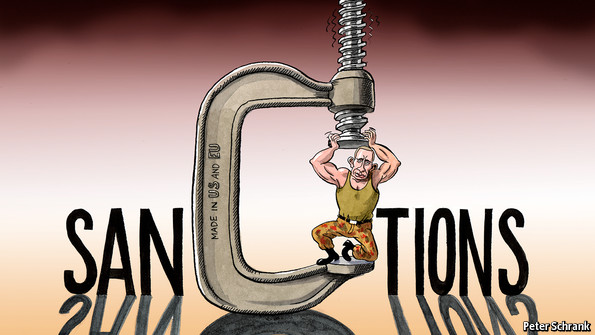
Relations between the United States and Russia remain on a dangerous trajectory. Trump’s personal ties and those of some of his associates (and cabinet members) with Russian companies and oligarchs are tight. There are many shared interests, from astronomical investments in the energy sector to gigantic transactions in real estate and other sectors of the economy, real and financial. That explains the U.S. president’s desire to improve relations with Moscow.
However, a good part of the establishment in Washington is determined to promote a climate of tension and direct antagonism. For many conservatives and liberals, the animosity toward Russia seems to be a ground on which they can agree. The result is a latent struggle between the White House and the Capitol for control of U.S. policy toward Russia.
On June 15, the U.S. Senate passed Law S.722, entitled: “Law to Examine and Counteract the Aggressions of Iran and Russia.”* The section on Russia was added to a law aimed at tightening sanctions against Iran. But the addition turned out to be bigger and more important than the main text that focused on the measures against Tehran. Despite what its title might indicate, most of this new instrument is aimed at Russia. This is a further stage in the application of sanctions against individuals and companies in Russia. And some of the sanctions could be applied to European companies interested in investing in energy projects that Russia considers a priority.
The most important aspect of the new law is that it codifies the existing sanctions, which prevent the tenant in the White House from eliminating the penalties with a stroke of the pen through a simple executive order. This measure is seen by Trump and his advisers as a veritable declaration of war against the executive branch. The truth is that the president will no longer be able to use his discretionary power over these sanctions in the negotiations that will surely open soon with Putin.
The most important part of the new law expands the sanctions that already exist against Russia in the energy sector. Currently, existing sanctions prohibit companies in Western countries from providing goods and services for the development of so-called next-generation projects in the Russian energy sector. These projects include investments in offshore platforms in the Arctic, very deep drilling, as well as investments in shale oil and gas. The new law applies sanctions against Russian companies involved in these types of projects regardless of their location. This makes the acquisition and assimilation of new drilling technologies by these Russian companies more difficult.
Moreover, the new law applies sanctions to foreign companies that make significant investments in next-generation energy projects. This is a case of secondary sanctions that has many implications. The extractive industry involving shale oil in the United States has suffered the collapse of crude oil prices, but has been able to recover with a great effort to reduce production costs. However, the fear that some competitors might snatch up market shares is a strong motivation to impose restrictions on investments in this sector in Russia.
The impact of these sanctions on the energy sector in Russia is considerable. It is most likely to delay the development of new projects for many years. For Moscow, that is an unforgivable blow. But that’s not even the worst impact.
The new law would penalize companies participating in the Nord Stream II project, which connects Russia and Germany via a pipeline from the Baltic. In fact, this measure is aimed at hindering exports of energy through pipelines or by means of tankers. And here the law also strengthens the regimen of sanctions on privatizations that grant exorbitant benefits to officials of companies whose assets are sold to the private sector. That is, the law is aimed at the oligarchs who control strategic sectors of the Russian economy. They are the same oligarchs who have previously been useful for all kinds of shady business with U.S. companies. Today, priorities have changed.
The sanctions Washington wants to impose on Russia are linked to its goals in Ukraine, Syria and to its drive to control the world energy market. Trump may be more interested in the projects of his companies and those of his friends (like Rex Tillerson, his secretary of state). But the priorities of empires are usually more important than those of the reigning emperor. The sanctions imposed on Russia constitute a hostile act. Many wars have begun with these types of measures.
*Translator’s note: The bill is called: “S.722 – Countering Iran’s Destabilizing Activities Act of 2017. The subtitle is: “To provide congressional review and to counter Iranian and Russian governments’ aggression.”

Leave a Reply
You must be logged in to post a comment.